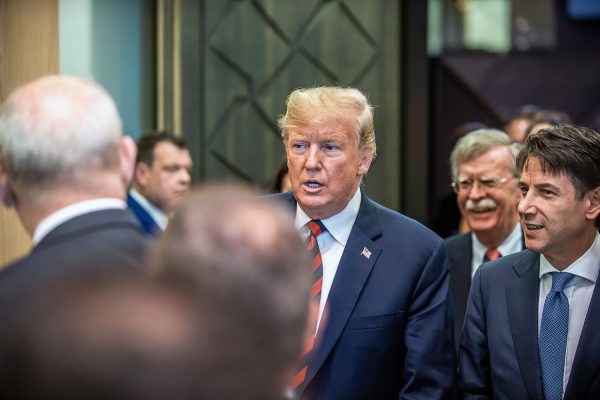
Donald Trump has finally unveiled his “deal of the century” for peace and prosperity in the Middle East — and set the region ablaze with criticism.
The president’s plan recognizes Israeli control over most, if not all, of the settlements in Judea and Samaria (the West Bank), excludes most of Jerusalem from a future Palestinian state and accepts Israel’s position that “refugees” (the descendants of Palestinians who were displaced in the 1948 war) will be resettled outside Israel.
In return for accepting these conditions and renouncing terrorism and incitement, the Palestinians would receive a municipality-sized, demilitarized and completely dependent “state.”
Israeli public reaction
Israeli prime minister Benjamin Netanyahu, who appeared on the same stage as Trump when the president announced his plan, called it “an historic event” and immediately declared that Israel would annex those territories assigned to it by Trump’s deal, including the Jordan Valley.
Contrary to Netanyahu, most pundits in Israel view the plan as a disaster and a charade.
Even though the plan gives Israel virtually everything it wants, most commentators and activists from across the political spectrum see the proposal as a Trump-Netanyahu stitch-up to save themselves from impeachment and prosecution, respectively. (Netanyahu was indicted for corruption the same day the plan was announced).
The timing is suspicion. Israelis must go back to the polls for the third time in a year to break the deadlock in the Knesset, where Netanyahu’s conservatives and their centrist opponents, led by former army chief Benny Gantz, are evenly matched. Pundits condemn the peace plan as blatant intervention by the American president to help Netanyahu’s reelection bid.
Trump himself voiced the counterargument when he argued that, in the current political context in Israel, anytime is either just after or shortly before an election. Waiting any longer would mean never releasing the plan at all.
A more important criticism is that the plan utterly fails to take Palestinian wishes into account. Critics maintain — probably correctly — that the Palestinians will never agree to its humiliating terms.
On the other extreme, Israeli hardliners reject even the Trump plan’s minute Palestinian state. They hope the Palestinians will turn it down, thus allowing Israel to reap all the benefits of annexation without paying any of the costs.
Partners in crime
The logical conclusion of all this is that Trump’s plan was never meant to bring peace. But that doesn’t mean it was all about politics.
The plan’s true significance lies in what it says about the American-Israeli relationship. Anyone who tuned in to the Trump and Netanyahu press conference could not help but notice the personal affinity between the two leaders. Their speeches were also imbued with religious undertones and even civilizational connotations. Both espoused a sort of Judeo-Christian alliance and spoke in us-versus-them (i.e., the Arabs) terms. (Although both wisely refrained from mentioning the plan’s stipulations for the Temple Mount.)
This is unsurprising. Netanyahu was one of the first world leaders who understood that you’re either with or against Trump. He decided to throw in his lot with the Republican, no matter how dangerous his actions or rhetoric might prove for Israel.
Netanyahu reportedly encouraged Trump to withdraw from the Iran nuclear deal his predecessor, Barack Obama, negotiated, a move that has allowed Iran to enrich higher levels of uranium than before. He also defended Trump’s decision to kill Iranian general Qasem Soleimani against the advice of his own experts and despite the risk of Iranian retaliation.
Neither Netanyahu nor Trump may be in power for much longer. This could be Netanyahu’s last chance to take advantage of what remains of America’s unipolar hegemony in the region to realize his nationalist camp’s goal of creating a “greater” Israel — while burying the two-state solution for good.
In their desire to fundamentally transform the Middle East, Netanyahu and Trump aren’t just close allies; they are partners in crime.
